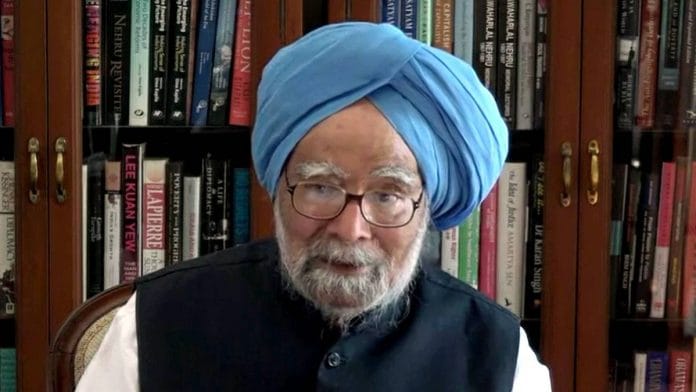New Delhi: The Western world’s reduced dependence on Russia and China could open newer avenues for India, former prime minister and finance minister Manmohan Singh wrote in a column in The Hindu newspaper Friday.
Singh wrote that as the Western bloc looks to pivot to a “free but principled trade” approach that values both money and morals, India stands to gain.
Singh, also a former RBI governor and acclaimed economist, wrote the column in the context of the Russia-Ukraine war and the international isolation of the Kremlin. He talked about the implications of the conflict on the world order and free trade, India’s trade opportunities in the world, and the need for social harmony in India for economic prosperity.
Manmohan Singh said India must base its trade mechanisms and agreements on the dollar to be able to exploit the avenues that the shifting world order would open up.
Bilateral currency negotiations and frameworks, like the Indian rupee-Russian rouble agreement in the late 1970s and 1980s, are no longer in India’s interests, he wrote.
“Such isolated bilateral agreements are fraught with risks, but when trade is a small share of the economy, and such agreements are limited to a few trading partners, it was wieldy,” Singh explained. “In the long run, India stands to gain more from unfettered access to the Western bloc markets for Indian exports under the established trading order than from discounted commodities purchased under new bilateral currency arrangements that seek to create a new and parallel global trade structure.”
He also wrote that conflict “deeply saddened him”.
“Talk of nuclear threats have alarmed me. Regardless of provocations and causes, however justifiable they may seem to be, violence and consequent loss of human lives are deeply regrettable and avoidable,” he stated.
Also Read: Why Ukraine’s Kreminna, now under Russian control, is key to second phase of invasion
Myth of economic interdependence
Singh wrote that the fall of the Berlin Wall in 1989 created “a paradigm of free societies, frictionless borders and open economies evolved to be the governing order in many nations”.
This, he explained, led to a period of “freer movement of people, goods, services and capital across the world. Global trade and per capita GDP nearly doubled in this period, marking an era of general peace and prosperity”.
Writing about economic interdependence, the former PM pointed out that this free movement led to societies and economies in the world becoming intertwined.
“Such tight inter-dependence among nations will lead to fewer conflicts and promote peace, was the established wisdom,” he added.
The Russia-Ukraine war, he said, has shattered this wisdom.
“If inter-connectedness and trade among nations were mutually beneficial, then it follows that its disruption and blockade will be mutually harmful. Retaliatory economic sanctions imposed on Russia have hurt all nations, albeit some more than the others,” he wrote.
Also Read: Rupee-rouble romance was for Soviet era. Not trade option now for India-Russia
On the imbalanced criticism of Russia
Singh also reflected on the imbalanced criticism of Russia in the world.
“Nations that did not condemn the Russian aggression in the United Nations,” he wrote, “constitute more than half the world’s population but a quarter of the world economy versus nations that condemned Russia, account for three-quarters of the global economy”.
The countries that did not criticise Russia are large producers with rising consuming power, he wrote.
In contrast, those that did criticise Russia, the Western powers, are large consumers.
“Any new curtain that descends between these two blocs and divides them will cause major upheavals to the entwined global economic equilibrium,” he said.
Social harmony, edifice of economic prosperity
As India is balancing fraught geo-economic realities, Singh warned that India must maintain its domestic-social equilibrium.
He wrote that while India would have massive opportunities to enhance trade and prosperity, it could only be achieved through social unity.
As Mahatma Gandhi’s nation, he wrote, India must be a committed and relentless apostle of peace and non-violence, both at home and in the world.
“Social harmony is the edifice of economic prosperity,” the renowned economist wrote.
Singh added that to be a large-scale producing nation, India will need millions of factories with hundreds of millions of people of all religions and castes across all states to work together — once again emphasising social harmony.
“India can be the fulcrum of a new global order, as a peaceful democracy with economic prosperity,” Singh wrote. “But this requires India to first stem the raging communal divisions within. I sincerely wish and fervently hope that India can emerge as the harbinger of peace, harmony and prosperity in this new world.”
(Edited by Uttara Ramaswamy)
Also Read: Russian Navy’s ‘pride’ Moskva gutted by fire, Ukraine claims its Neptune missile hit the ship






